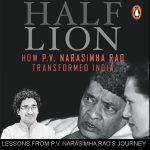Home › Nugget

6 - Staying relevant through transitions - Vinay Sitapati on leadership under constraints – Lessons from PV Narasimha Rao’s journey
Vinay talks about how Narasimha Rao stayed relevant through the various transitions that he went through in his journey. He also talks about how he learns and grows when he did not gets a transition wrong. He also talks about how Narasimha Rao re-invented himself when Congress moved from the Indira Gandhi phase to the Rajiv Gandhi where the core group had several people from an Oxbridge background (far from Narasimha Rao’s comfort zone).
More from same Guest
Vinay talks about how he has thought about his career choices. He speaks about the fact that after his 12th, he could have possibly become an architect instead of a Lawyer. He also talks about his thinking at each of the transition points where he made critical choices (Law versus Architecture, Law to Journalism, Journalism to study PhD in Politics). He also talks about how he thinks more about the quality of the product he creates with his diverse backgrounds than sweat about the notion of his identity.
Vinay talks about how the same judgment can have a different journey of implementation depending on the ecosystem in which the judgment is pronounced. He talks about the distinction between barking and biting when he looks at a Judgment. He urges the leaders (Judges, Lawyers, CEOs) to think hard about the ecosystem they are in and the control they have over implementation before they go for a certain verdict.
Vinay talks about Narasimha Rao’s habit of reflection and journaling which helped him deal with the ecosystem he was in. Vinay talks about how Rao used the habit of journaling to develop a nuanced understanding of the context he was in which helped him deal with situations of grey effectively. He also talks about how he managed to gather intelligence around what was happening around him despite his lonely nature.
Vinay talks about Narasimha Rao spent his time at various points in his career. More specifically, he breaks down the pie chart of time across different phases – when you are campaigning, when you are in power and when you are in opposition. He talks about how Narasimha Rao had unfettered curiosity that helped him indulge his curiosity when he was in opposition which helped him evolve as a person but also ensured that he did not make any hasty decisions in the short-term out of anxiety that would hurt him in the long run.
Vinay talks about how Narasimha Rao combined the notion of intellectual agility (ability to fundamentally shift one’s beliefs when new data presents itself) and implementation agility (knowing how to drive change through a complex system). He talks about how Narasimha Rao could play Lion, Fox or Mouse and the criticality of timing in these situations.
Vinay talks about how Narasimha Rao stayed relevant through the various transitions that he went through in his journey. He also talks about how he learns and grows when he did not gets a transition wrong. He also talks about how Narasimha Rao re-invented himself when Congress moved from the Indira Gandhi phase to the Rajiv Gandhi where the core group had several people from an Oxbridge background (far from Narasimha Rao’s comfort zone).
Vinay talks about how Narasimha Rao picked his team members and think about the portfolio of capabilities in his team. He specifically alludes to the fact that he was self-aware about what he knew and didn’t know and was able to hire best in class talent without feeling insecure. He also talks about how Narasimha Rao brought in diversity of thought across various topics to ensure it was a balanced team.
Vinay talks about how Narasimha Rao made decisions or chose not to make decisions strategically depending on the political context. He mentions that often people think of Narasimha Rao as an intellectual but Vinay argues that he was a man of action but also somebody who was acutely aware of his political ability to drive through change.
Vinay discusses Narasimha Rao’s strategy to usher in liberalization without too much fanfare given the fragile situation he was in. He shares his thoughts on how some other politicians have managed to drive tough change with the support of the public which involved long term gains (Park Chung-hee in South Korea, Lee Kuan Yew in Singapore) but short term pain.
Vinay talks about how Narasimha Rao was a fusion of Don Quixote (somebody who acted without too much thinking) and Hamlet (somebody who thought a lot but didn’t act as much) and how he brought the various shades of gray in his personality to bear as a leader. He talk about how we need to be cognizant of our environment when we think about what we do and how we implement it.